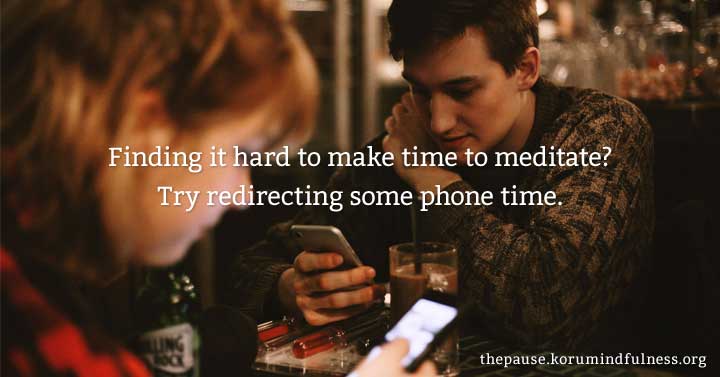
I love my smart phone. I bet you love your smartphone. And yet, since the moments in our days are finite, it is always true that moments I spend on my phone are moments that I’m not doing other things.
Which begs the question,
“Am I hitting the balance I want to hit between time on my screen and time on the rest of life?”
I started thinking about this lately because I’ve been pondering a change I’ve noticed in my Koru students over the last 7 or 8 years. It used to be that most of the students who took my Koru classes found it fairly doable to keep up with the 10 minutes/day of meditation practice that is assigned during the course.
Sure it was hard at first and there was always a struggle to find the best time of day, but most people consistently did the 10 minutes a day and kept track of it on their logs as part of the course.
 But in the last several years, I’ve noticed it is harder and harder for students to do this. My students report feeling so much time pressure. They feel like there is never enough time and it really stresses them out.
But in the last several years, I’ve noticed it is harder and harder for students to do this. My students report feeling so much time pressure. They feel like there is never enough time and it really stresses them out.
Often, they feel like they can’t find 10 minutes in their day. I spend a lot of time coaching them to find at least 5 minutes a day to practice mindfulness and see if they can build from there.
I’ve been wondering…
Why do college students feel so much more time pressure than they did just a few years ago?
And then I read this article where I saw this graph:
All this suggests that folks might rather look at their phones then go out with friends and get enough sleep, even if it makes them feel less happy in the long run.
Then I heard that Nielsen reported that in 2012, the number of folks in the US who had smartphones surged above 50%.
These days adults in the US spend an average of 4 hours a day on their phone. College students in some studies spend twice that amount of time.
It’s no wonder students find it harder to free up 10 minutes in their day than they did a few years back. Their phones have effectively taken 4 hours or more out of their day!
My own experience is that I can get drawn into my phone, checking this and that or playing a game, and before I know it a lot of time has gone by. When I sit down to work on a project, sometimes I feel the urge to play with my phone first, which eats up some of the time I would have used getting my work done.
Ready to take your meditation practice to the next level?
Join us as we partner with iBme for a Spring Break Meditation Retreat!
Students tell me all the time that they get pulled into their phone in the same way. It’s just so easy to pick up the phone for a little distraction or avoidance.
Of course, there is nothing wrong with a little distraction or avoidance, but if that turns into your spending so much time on your phone that you are just squeezing in the rest of life around it, you might start to feel that your life is not in balance.
So, what can you do about this? You’re probably not going to be willing to give up your phone. I know I’m not. But such extreme measures are rarely needed. Usually there is a middle path between being out of control of your phone use and throwing your phone in the trash.
To find this middle path, the first step is to start becoming super aware of when and why you pick up your phone.
A mindfulness practice can help with this, because mindfulness will help you notice the thoughts, impulses and feelings that come along with your phone use.
Start by noticing:
What are you thinking when you reach for your phone? What are you feeling? Can you notice the impulse to reach for the phone and then pause for a second before you grab your phone? Take a breath and get curious. What does that impulse feel like? When you are on your phone, what are you doing? How are you feeling? If you have the thought, “I should put this down,” what thoughts or feelings might keep you from actually putting the phone down? Can you feel the sensations or thoughts that keep you drawn in? When you put your phone away after you have been on it for awhile, how do you feel? Could you put your phone at the bottom of your bag for a few hours and not even check it? How do you think that would make you feel? Now try it and see if you feel the way you guessed you would.Our lives are full of interesting opportunities for learning, fun and connection. Our phones can be a source of pleasure and help connect us with the rest of life. But they can also become a way of keeping us from engaging more fully in life. I have yet to hear of anyone, who on their deathbed said that their one regret was not having spent more time on their phone.
If you are trying to build a daily meditation practice but have a hard time making the time for it, you might get curious about pulling ten minutes a day from the time you spend looking at your phone.
It might be an interesting experiment to see how it feels to salvage 10 minutes from your phone time and redirect it towards 10 minutes of mindfulness practice. Try it for one week and see what you notice.
Do you have other tips for optimizing your phone use so it doesn’t control your life? Please share them below .
Photo by Jacob Ufkes on Unsplash
Get our latest articles in your inbox.
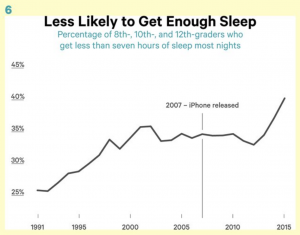
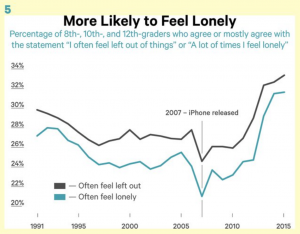
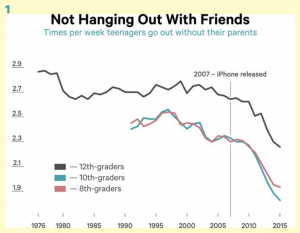
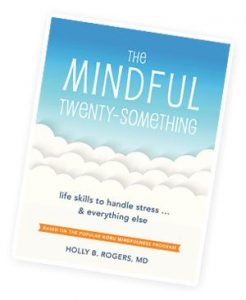
Thanks for sharing such a great article with us! You describe the true problem of the modern life. All of us should not use our phones that much. We should spend more time with our children, parents, friends and relatives. Thanks for sharing!